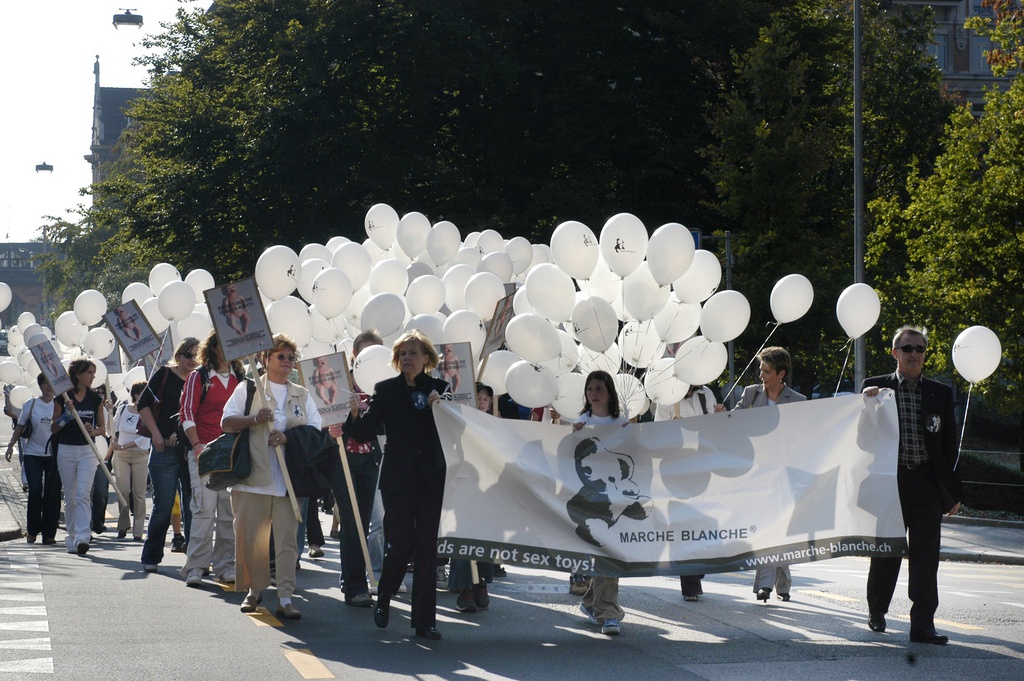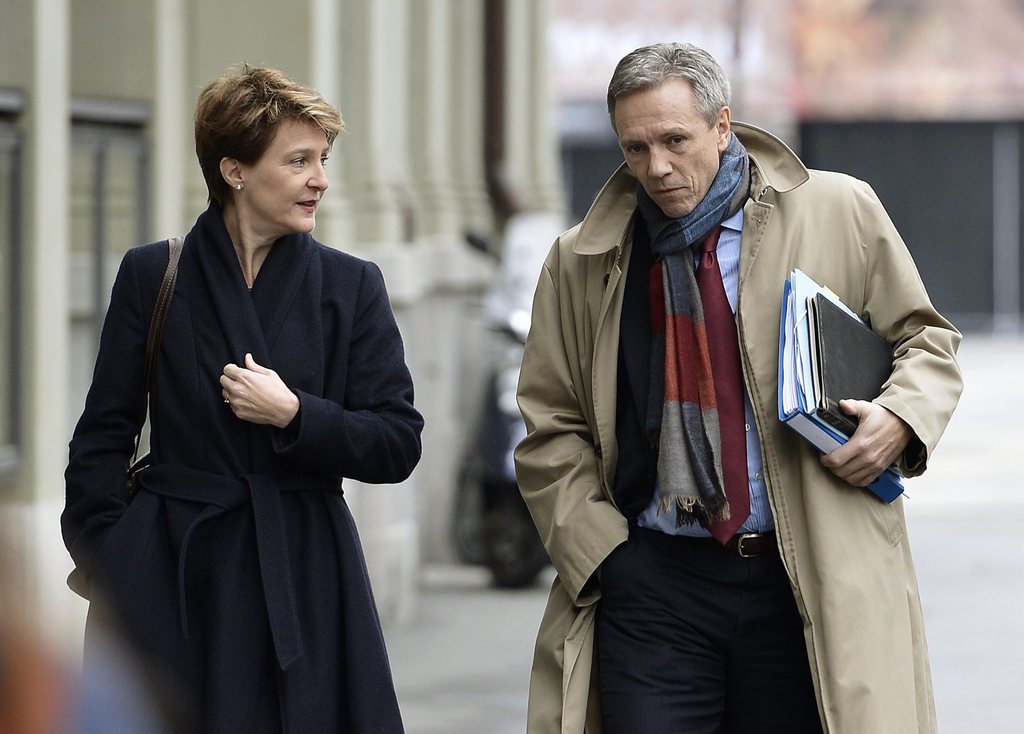And if voters are not always right?

Various recent people’s initiatives in Switzerland have raised doubts about their applicability. The latest concerns paedophilia. At stake is not only respect for the state of law, but also citizens’ faith in institutions.
“Everyone agrees that paedophiles shouldn’t come into contact with children,” says former federal judge Claude Rouiller. But in his view the problem lies elsewhere.
“The initiative imposes an automatic and irreversible professional ban on anyone who has been found guilty [of paedophilia]. That goes against the principle of proportionality, which is one of the pillars of the Swiss constitution.”
Rouiller warns that the initiative, promoted by the Marche Blanche organisation and approved by the Swiss people on Sunday, poses a serious problem when it comes to applicability, not to mention consistency between constitutional principles.
“In order to guarantee respect for proportionality, you have to weigh up two factors: protection of the individual – on which all democratic or republican states are built – and safeguarding orders.”
In other words, the means should be proportional to the aim – in this case, the protection of childhood.
“In my view, therefore, any automatism – which prevents judges from taking into account context or degree of guilt – is in itself disproportionate,” he says.
In addition, Rouiller finds the irreversibility of the professional ban problematic. “It’s impossible and unfair to determine a priori, even if motivated by anger or legitimate fear, that a person who has committed an offence can never be cured. Studies show that a certain type of paedophilia can be cured.”
‘Legitimate concern’
During the pre-vote campaign, other opponents of the initiative loudly pointed to the risk of the state of law being violated. It’s a strong argument, but far from easy to sell, since legal experts are not unanimous.
Paolo Bernasconi, lawyer and former prosecutor from Italian-speaking Switzerland, defends the Marche Blanche initiative, convinced that the principle of proportionality is not in danger.
“For convicted paedophiles, the freedom of choice is exclusively limited – but there are an infinite number of jobs out there. This seems to me a somewhat reduced restriction of rights, given the aim of protecting children and dependants from the risk of paedophile acts,” he said.
It should be pointed out that the professional ban has also been written into the revision of the penal code approved by parliament last autumn, but in this case judges still have to decide to what extent to make use of it.
For Bernasconi, automatism is necessary. “In actual fact, the possibility of banning people from certain jobs is written into the penal code of 1942, but judges have never made use of it,” he said.
“So the lawmaker is called to act. It’s not a sign of mistrust towards the judges, but a specific measure in response to a legitimate concern and which can be justified by reasons of prevention and the protection of society.”
Paradox
In recent years, political debate has frequently been imbued with legal arguments, sometimes creating confusion among the population.
Voters have found themselves presented with controversial initiatives which raise problems of application and enforcement. Examples include the locking up for life of serious sex offenders or extremely dangerous violent offenders, approved in 2004, and the automatic deportation of criminal foreigners, voted on in 2010 but whose application is still being discussed by parliament.
“Lawmakers and jurists are faced with a paradox: on the one hand they are called on to respect the will of the people, and on the other to safeguard the principles of the state of law,” says Heinrich Koller, a professor of public law and former head of the Federal Justice Office.
A balancing act, which sometimes forces judges to “interpret” what voters mean or to respond to courts such as the European Court of Human Rights in Strasbourg.
The risk, in the long term, is of a growing lack of trust among citizens in their own institutions, Koller says.
“If people get the impression that their wishes aren’t being respected when laws are implemented, it’s clear that it will be increasingly hard to have confidence in government, parliament and the courts.”
Koller adds, however, that part of the responsibility can be attributed to the same politicians, who “no longer manage to convince voters that some initiatives are irrational and impossible to implement. They are removed from citizens and not capable of explaining to them the fundamental values of our constitution and of the state of law.”
Dogma
Rouiller says the fact that these “absolutist initiatives” are launched in a systematic manner makes him wonder whether they are not guided by a desire to weaken Swiss institutions.
“That scares me. I have the impression we’re heading towards adopting a dogma which says the people are always right. But they’re not. If we leave it to the people to define the scope of law, we risk going towards a system that is state-planned or authoritarian, contrary to democracy. And that’s unacceptable.”
Also Bernasconi, who defends the text of the paedophile initiative, says he’s concerned by possible drifts of direct democracy.
“Some initiatives claim to solve major problems with ad hoc measures which don’t take into account the whole range of rules which regulate the civilised coexistence of our country,” he says.
“It would be necessary to introduce a judicial body – completely neutral and impartial – charged with checking not whether an initiative is fundamentally good or bad but whether it is constitutional.”
In recent years, many sides have raised the possibility of introducing a system of checking federal laws and, with greater reason, initiatives which are against the Swiss constitution or a supranational law to which Switzerland has agreed to subject itself, such as the European Convention on Human Rights.
But whose job would it be to carry out this task? Parliament? The judiciary? For the time being it appears the political parties are a long way from agreeing on an answer.
Precedence of Swiss law over international jurisdiction has become a political issue in Switzerland.
The rightwing Swiss People’s Party says it will launch an initiative aimed at enshrining absolute priority of Swiss law in the constitution.
However, a study commissioned by a broad alliance of human rights organisations, has found that Switzerland would undermine its credibility if it decided to ignore rulings by the European Court of Justice.
Legal experts also rejected a partial opting out for Switzerland.
(Translated from Italian by Thomas Stephens)

In compliance with the JTI standards
More: SWI swissinfo.ch certified by the Journalism Trust Initiative













You can find an overview of ongoing debates with our journalists here . Please join us!
If you want to start a conversation about a topic raised in this article or want to report factual errors, email us at english@swissinfo.ch.